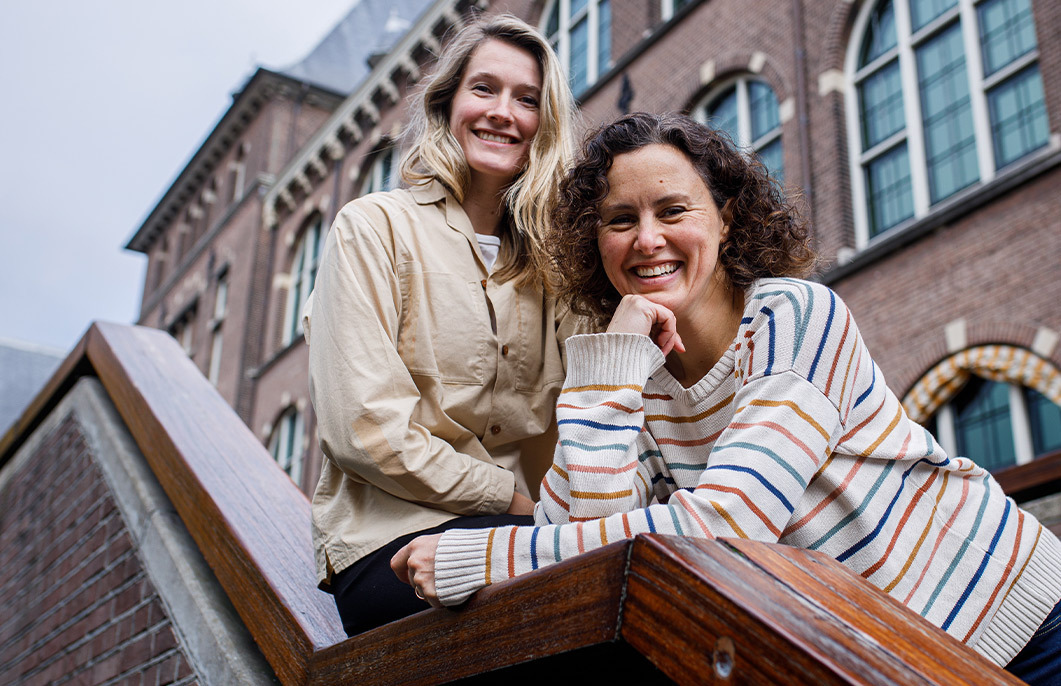New management board, familiar faces

What is your experience and how will this serve you as directors?
Manon: I have been working at Impact Hub Amsterdam for five years now and lead the accelerator programs for starting and growing entrepreneurs, focusing on a circular economy, sustainable food and fashion chains, and inclusive society. As a director, I will remain closely involved in these programs and continue to expand these thematic ecosystems. I also keep in touch with former participants and stay informed of their development, stories and new steps or issues.
Ilse: I have been working at Impact Hub Amsterdam for about seven years now. I started as a scout and set up the Source & Match department. A department that builds bridges between the new and old economy by matching sustainable innovations to the business community. I will continue to be involved with Source and Match in my new role.
Why do you work in the impact sector?
Manon: Impact entrepreneurship is an effective and positive way to transition to a sustainable and inclusive economy. Impact entrepreneurs are the innovators who put their heart and soul into this. Through my work at Impact Hub, I can help strengthen and connect these entrepreneurs, and bring the new economy closer.
Ilse: During your working life, you spent 80,000 hours on your job. There is nothing better than using it for a more sustainable and better economy. I knew from an early age that I wanted to do something to fight climate change, and because I am solution-oriented and like to show what is possible, impact entrepreneurship suits me perfectly.
How do you amplify each other in this shared management role?
Manon: Ilse and I already know each other and the team very well. We have always worked closely together, and it feels like a natural step to now lead the company together. Together we unite the capabilities and network needed to achieve our goals. Ilse is an entrepreneurial, innovative leader who quickly sees new opportunities and knows how to get everyone on board and excited about taking a step towards sustainability together.
Ilse: We can only create a new economy through collaboration. With our shared management role, we want to show that 1+1 is 3. Manon is action-oriented but also pragmatic. She is at the forefront of systemic change towards a new economy. Over the past few years, we have worked hard with our team to bring Impact Hub to the current level. As directors, we can further develop this path.
What would you like to achieve as an Impact Hub in the Netherlands?
Manon and Ilse: Since 2008, we have been putting impact entrepreneurship on the map in the Netherlands by helping entrepreneurs bring solutions into practice. As a result, successful sustainable examples are now available in all sectors. In the future, we want to help even more sustainable companies to make an impact in their industry. And show the business community that sustainable entrepreneurship is the norm, also because it is financially beneficial and can be sustained in the long term.
What is your vision on the impact field?
Manon: Fortunately, impact entrepreneurship has received great attention in the Netherlands in recent years. Not only among entrepreneurs, but also among financiers and governments. But we are not there yet. If companies only take small steps towards sustainability, the major challenges of our time won’t be solved. That is why we must discuss the next step to develop impact entrepreneurship to really push through to the new economy. To understand what is really sustainable? Can all sectors continue to grow? The answer is no. How do we deal with ‘sufficiency’ or ‘degrowth’? These are not questions for individual entrepreneurs, but the impact sector can play an important role in that conversation.
What is the current state of the field?
Manon: Scientists indicate that we have until 2030 to fight the worst form of climate disruption, and it is already 2022. This development does not only concern CO2 but also how we handle raw materials and social justice in terms of working conditions and distribution issues. These are not easy topics, but areas that we want to talk about.
Ilse: It is good to see that the attention for these subjects has increased considerably. The discussion in society also sharpens, which is intense but also a crucial phase in transitions.
What could be improved?
Manon and Ilse: The Netherlands must re-evaluate how we organise certain initiatives that do not contribute to making sustainable choices (short-term profit, taxes, ownership). As an Impact Hub, we should share more examples of companies that implement an ‘innovative mindset’ to do business sustainably. This is how we can create an even bigger snowball effect.
Which projects can we expect in 2022?
Manon & Ilse: In our Food Ecosystem, we are working to transition towards a sustainable food system. In 2022 you will find the Village Food Pioneers program, the Impact The Food Chain Accelerator, and various food events. We also publish studies like the trend report Alternative proteins: the new plan A.
Over the next three years, in the field of circular economy, we will work as CIRCO Hub Noord-Holland with 150 SMEs and assist them with their transition to a circular business model. In addition, during the week of the Circular Economy, we will host various events for SMEs and startups and larger organisations, together with our partner Province of North-Holland.
In our Inclusion ecosystem, we conduct European research to strengthen entrepreneurship among newcomers through the MIG.EN.CUBE project. We also work to stimulate female entrepreneurship in the WeRIn project and the LIAISE project. Finally, we will match and implement 70 sustainable innovations in business this year. You can stay informed about all our projects via our newsletter.